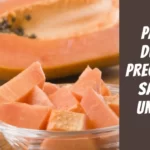
If you are pregnant, you may be wondering if it is safe to eat feta cheese. Feta cheese is a soft cheese that is commonly used in salads, sandwiches, and other dishes. In this article on PregnancyBoss, we will answer some of the most frequently asked questions about eating feta cheese while pregnant.
Related: Can You Safely Eat Lobster During Pregnancy?
What is Feta Cheese?

Feta cheese is a popular cheese that is made from sheep’s milk or a combination of sheep’s and goat’s milk. It is a soft cheese that has a crumbly texture and a tangy flavor. Feta cheese is a good source of protein, calcium, and other essential nutrients. However, pregnant women are often advised to avoid soft cheeses like feta because they may contain harmful bacteria including Listeria that can cause foodborne illness.
Related: Can Pregnant Women Eat Seaweed?
What is listeriosis and its symptoms?
Listeriosis is a serious bacterial infection caused by Listeria monocytogenes. It is usually contracted by eating contaminated food. According to the CDC, an estimated 1,600 people get listeriosis each year, and about 260 die. The infection is most likely to sicken pregnant women and their newborns, adults aged 65 or older, and people with weakened immune systems.
The symptoms of listeriosis vary depending on the person infected and the part of the body affected. Almost everyone who is diagnosed with listeriosis has invasive infection, meaning the bacteria spread from their intestines to the blood, causing bloodstream infection, or to the central nervous system, causing meningitis. Although people can sometimes develop listeriosis up to 2 months after eating contaminated food, symptoms usually start within several days.The symptoms of listeriosis include:
- Fever
- Flu-like symptoms, such as muscle aches and fatigue
- Headache
- Stiff neck
- Confusion or changes in alertness
- Loss of balance
- Convulsions
- Diarrhea or upset stomach
Pregnant women are 10 times more likely than other people to get a Listeria infection. Many pregnant women do not have any symptoms, but they can pass the infection to their fetus, which can cause serious infections of the blood or brain.
Babies born with listeriosis may have lifelong health problems, including intellectual disability, paralysis, seizures, blindness, or problems with the brain, kidneys, or heart.
Listeriosis is treated with antibiotics. It is important to take the full course of antibiotics as prescribed by your healthcare provider, even if you start to feel better. If you don’t finish your full course of antibiotics, your listeriosis may come back and be more challenging to treat.To reduce the risk of contracting listeriosis, it is important to take precautions with what you eat and drink and how you store and prepare food. This is especially important for people with weakened immune systems, pregnant women, and the elderly.
Related: Is It Safe To Eat Halibut During Pregnancy?
What is the nutritional value of Feta Cheese?

Feta cheese is a moderate-calorie, nutritious cheese packed with good amounts of minerals, vitamins, and protein. One ounce (28 grams) of feta cheese provides the following nutrients:
- Calories: 74-76
- Fat: 5.3-6 grams
- Protein: 4-5.3 grams
- Carbs: 1.1-1.56 grams
- Calcium: 14-740 mg
- Phosphorus: 9% of the RDI
- Riboflavin: 14% of the RDI
- Vitamin B12: 8% of the RDI
- Sodium: 13-31288 milligrams
- Selenium: 6% of the RDI
- Vitamin B6: 6% of the RDI
- Zinc: 5-26% of the RDI
It also has decent amounts of vitamins A and K, folate, pantothenic acid, iron, and magnesium.
Related: Can You Eat Kielbasa When Pregnant?
Is It Safe to Eat Feta Cheese While Pregnant?

The short answer is yes, you can eat feta cheese while pregnant, but you need to be careful about the type of feta cheese you choose. If the feta cheese you select has been pasteurized, then it is generally safe to eat during pregnancy. Pasteurization is a process that kills harmful bacteria, including Listeria, which can cause foodborne illness. In fact, eating feta can be a delicious way to get some of the key nutrients you need while you are pregnant.
Related: Can You Safely Eat Mozzarella While Pregnant?
What Are the Benefits of Eating Feta Cheese while Pregnant?

Feta cheese is an excellent source of protein, which is extremely important for the child and the mother. It also supports the health of the bones of a pregnant woman, increases immunity, improves bowel function, helps prevent anemia, provides good condition of hair, nails, and skin, and strengthens the nervous syste. Strong maternal immunity is important for maintaining the health of the baby, and eating feta cheese increases the maternal immunity.
What Are the Risks of Eating Feta Cheese while Pregnant?

The main risk of eating feta cheese, or any soft cheese during pregnancy, is that it can contain a harmful type of bacteria called Listeria monocytogenes that can be very harmful to your unborn baby. Listeriosis, the infection caused by the bacteria, can cause miscarriage, premature birth, or severe illness or death of a newborn. However, the risk of getting sick from Listeria is low, and most cases of Listeriosis are mild.
How much Feta Cheese can be consumed in a day during pregnancy?

As a general guideline, it is recommended to limit your feta cheese consumption to about 1 to 2 ounces per day. This translates to roughly 28 to 56 grams. By sticking to this portion size, you can enjoy the flavors and benefits of feta cheese while minimizing any potential risks, particularly those associated with listeriosis.
Are there any types of cheese that are recommended for pregnant women?
Here is a list of cheeses that are recommended for pregnant women:
- Hard cheeses such as cheddar, Parmesan, Gruyere, Comté, Manchego, Jarsberg, and Red Leicester.
- Soft pasteurized cheeses such as cottage cheese, mozzarella, feta (if made from pasteurized milk), paneer, and bocconcini.
- Pasta filata cheeses such as Mozzarella, Burrata, Provolone, String Cheese, and Caciocavallo (if made with pasteurized milk).
- Brined cheeses such as Feta, Halloumi, and Marinated Goat Cheese.
Are there any other types of cheese that pregnant women should avoid?
There are several types of cheese that pregnant women should avoid, including soft cheeses made from unpasteurized milk. These include:
- Brie
- Camembert
- Roquefort
- Feta (unless made from pasteurized milk)
- Gorgonzola
- Queso Blanco
- Queso Fresco
- Blue-veined cheeses
- Soft cheeses with a white coating on the outside
Conclusion
In conclusion, feta cheese can be a safe and enjoyable addition to your pregnancy diet if you choose the pasteurized variety. By selecting cheeses made from pasteurized milk and confirming their safety labels, you can savor the delightful flavors of feta cheese while pregnant without compromising your health or the health of your baby. As with any dietary choices during pregnancy, it’s always a good idea to consult with your healthcare provider to ensure that your nutritional decisions align with your specific needs and circumstances.
So go ahead, indulge in moderation, and relish the pleasures of feta cheese while nurturing your pregnancy journey.
Frequently Asked Questions (FAQs)
Can I eat feta cheese while pregnant?
What are the risks of eating feta cheese while pregnant?
What types of feta cheese should you avoid during pregnancy?
What are the benefits of eating feta cheese while pregnant?
Feta cheese is an excellent source of protein, which is extremely important for the child and the mother. It also supports the health of the bones of a pregnant woman, increases immunity, improves bowel function, helps prevent anemia, provides good condition of hair, nails, and skin, and strengthens the nervous system.
What other types of cheese are safe to eat during pregnancy?
Hard cheeses, such as cheddar, American, cottage, and cream cheeses, are generally considered safe in pregnancy. Pasteurized semi-hard and soft cheeses, such as cottage cheese, mozzarella, feta, paneer, ricotta, halloumi, cream cheese, cheese spreads, or processed cheese slices and spreads, may also be safely consumed.














